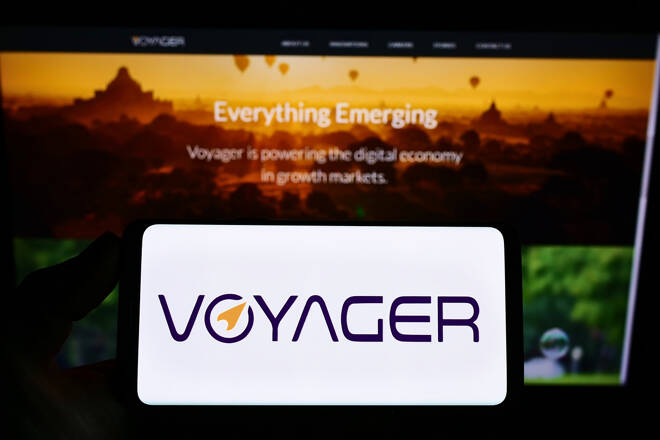Advertisement
Advertisement
Bankrupt Voyager Reacts to FTX’s Proposal Calling it a ‘Low-ball’ Bid
By:
A joint proposal that would allow Voyager customers to open a new account on FTX has been slammed by lawyers
Key Insights:
- Voyager recently suspended withdrawals, trading and deposits on its platform and filed for Chapter 11 bankruptcy.
- FTX is working with West Realm Shires and Alameda Ventures to allow Voyager customers to create new accounts on the exchange.
- Voyager’s lawyers claim that the joint proposal disrupts the bankruptcy process.
Last week it was announced that Sam Bankman Fried’s FTX is planning to offer early liquidity to customers of bankrupt crypto lender Voyager Digital.
Voyager Digital recently suspended withdrawals, trading and deposits on its platform, and filed for Chapter 11 bankruptcy after it was revealed that the Toronto-based firm has more than 100,000 creditors, somewhere between $1 and $10 billion in assets, and liabilities worth the same value.
Voyager’s Loan Book
The company’s subsidiary, Voyager Digital LLC previously issued a default notice to troubled hedge fund Three Arrows Capital (3AC) for the its failure to make required payments for a loan of 15,250 Bitcoin (BTC) and $350 million USD Coin (USDC).
Voyager’s loan book reportedly accounted for nearly half of its total assets, and roughly 60% of that loan book was comprised of loans to Three Arrows Capital.
As a result, FTX is now working with the company that owns FTX.US, West Realm Shires, as well as Alameda Ventures to allow Voyager customers to create new accounts on the exchange.
Select Voyager customers will have an opening cash balance funded by an early distribution on a portion of their bankruptcy claims and they can withdraw the cash immediately or use it to purchase digital assets on FTX.
Bankman-Fried noted that the purpose of the joint proposal is to help establish “a better way to resolve an insolvent crypto business” in a way that allows customers to obtain early liquidity and reclaim a portion of their assets without “forcing them to speculate on bankruptcy outcomes and take one-sided risks”.
In addition, Voyager has secured loans from Alameda Research to shore up protection for customer assets in the form of a non-binding term sheet for a $200 million credit facility compiled using a mix of cash and USDC. The sheet also includes a revolving line of credit for 15,000 Bitcoins (BTC).
Court Filing
In a surprising twist, lawyers representing bankrupt Voyager have labelled FTX’s proposal as a “low-ball bid dressed up as a white knight rescue”.
In the court filing, Voyager’s lawyers said the plan “transfers significant value to Alameda/FTX, and completely eliminates the value of assets that are of no interest to Alameda/FTX”.
The lawyers claim that AlamedaFTX’s proposal, which was made “in contravention of the proposed Bidding Procedures” has been designed to generate publicity and does not add value to customers. Their reasoning for this is that AlamedaFTX proposes a liquidation where FTX serves the role of liquidator, which could potentially mire how the value of Voyager’s cryptocurrency assets and loans is determined.
Bankman-Fried responded by saying that the move would give Voyager’s customers the ability to access assets that would otherwise be locked up for a significant time as the case goes through bankruptcy court. He added: “Our offer would give Voyager customers back 100% of the remaining assets that Voyager has, including claims on anything recovered in the future”.
CEO Steven Ehrlich recently confirmed that Voyager is undertaking a ‘Plan of Reorganisation’ that aims to enable clients to regain access to their accounts. Ehrlich reiterated that reorganising the company is the “best way” to protect assets on the platform so that Voyager can continue operating.
This means that customers with crypto in their account will receive a combination of crypto, proceeds from the Three Arrows Capital recovery, common shares in the newly reorganised company, and Voyager tokens.
About the Author
Mohadesa Najumiauthor
Mohadesa Najumi is a British writer who has worked within crypto, forex, financial technology, and the stock market industry. Mohadesa received her MSc in Political Science and International Relations at the University of Amsterdam.
Advertisement
